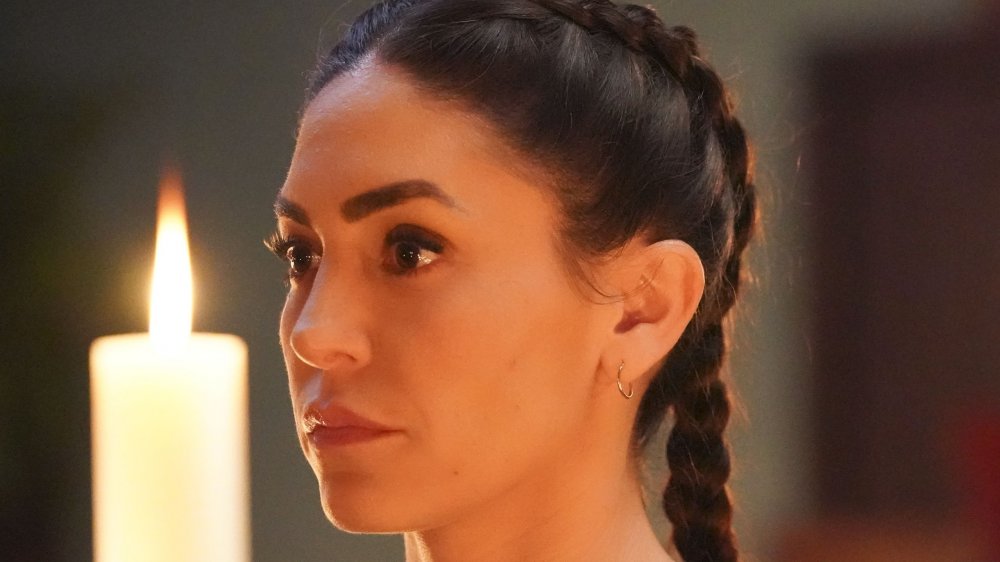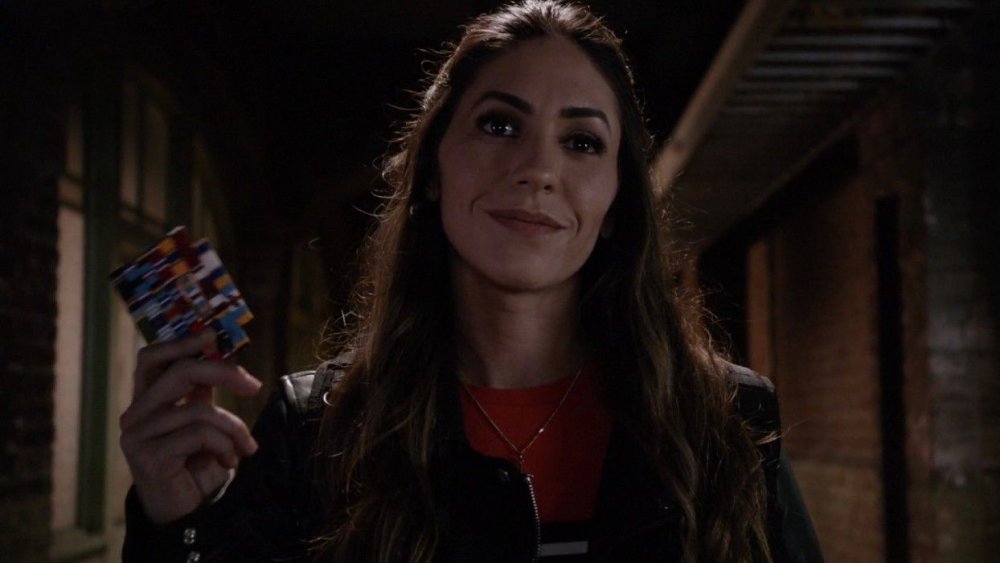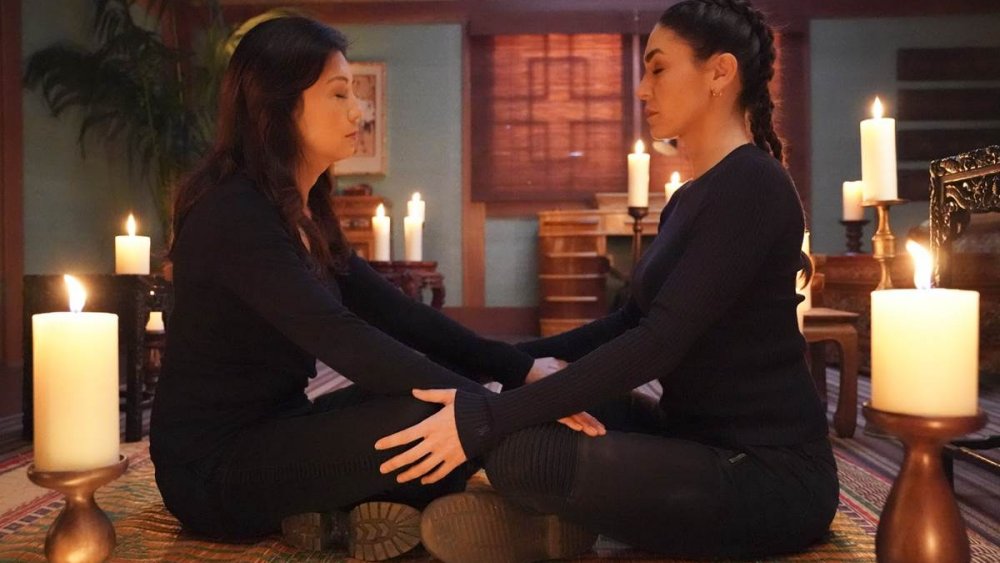Natalia Cordova-Buckley Discusses Agents Of S.H.I.E.L.D.'s Yo-Yo Rodriquez - Exclusive Interview
Natalia Cordova-Buckley isn't just a Marvel superhero. As Elena "Yo-Yo" Rodriquez on Agents of S.H.I.E.L.D., she is the Marvel Cinematic Universe's first Latina superhero. That's a big responsibility, and Cordova-Buckley knows it. While she only has 12 hours between when she was cast as Yo-Yo and when she began filming, the amount of thought and effort she's put into her character is obvious. Yo-Yo might not be the world's most effusive character, but thanks to Cordova-Buckley, she has a lot going on underneath the surface.
Now, with Agents of S.H.I.E.L.D. coming to its much-hyped close, it's time to look back. In our exclusive interview, Cordova-Buckley tells us what inspired her when building Yo-Yo's character, how Yo-Yo gave Cordova-Buckley a glimpse at her own personal super power, why being a part of the MCU is such a personal thrill, and what Marvel Studios would have to do to get Cordova-Buckley to shave her head and rock Yo-Yo's minimalist comic book 'do. It's all interesting information. It's also a testament to just how seriously Cordova-Buckley takes Yo-Yo and her legacy, and Agents of S.H.I.E.L.D. is all the better for it.
Natalia Cordova-Buckley's biggest inspirations, and what Yo-Yo has taught her
What have you learned from Yo-Yo? What has she taught you?
[Well, I wanted to make her] everything I ever would want to be. Everything I work towards and constantly fail at, I wanted her to have. There are all these women who were part of building her. I've said this in a couple of interviews, but I'll repeat it again: Angela Davis was a huge inspiration for Yo-Yo. There's one quote by her that says, "Being radical just means grasping things at the root." I think being radical has been sort of misinterpreted nowadays as barbaric, or that you don't think before you act. I wanted Yo-Yo to be radical in the sense that she would always think of the deeper impact.
She doesn't get her super powers and go, like most superhero stories, "Woe is me. Why did I inherit these powers? Why did I get them? I'm such a victim of them." She immediately finds out she has them and, even though she's scared, she interprets it as a sign from something bigger than us — God, if you want to say that — and she realizes that she's only worthy to have them if they're in the service of others.
That was a big lesson for me, because I correlated that with being a public persona, or as anyone with any sort of power created by the public. If I am given power through a platform for change with privilege, I become a megaphone. That is given to me. I do not own that power, and I can only be worthy of having it if I use it in the betterment of our world, in the service of others and those that have been oppressed, silenced, or disenfranchised.
For me, her super power represented that in my personal life. So that's a big lesson I took from her. My super power is the platform I have and what I do with it, and it's only worth it if I put it in the service of others and don't misuse it in the service of myself to keep empowering myself, whether it be monetarily or in any other material way. That was a huge lesson.
Then, just her stands. Constantly, her stands on the bigger impact. In season five, she's basically telling people, "We have to let Coulson die," and no one in the team gets it. When I would speak to some writers on what that transition for Yo-Yo meant, I would speak constantly of the deeper impact of our actions. What we say and what we do on a daily basis has a very profound impact, and we can't just think of how it impacts us and our own individual world, but how it impacts others.
That kind of social responsibility was something that she taught me and strengthened in me. It's a reciprocal, beautiful arrangement that Yo-Yo and I had where she's had me feeding her and I still couldn't grasp it for myself. We'd put it in her, and it would grow into or evolve into something I could then, as an individual, learn from. Yo-Yo became an enormous teacher for me in that way.
What it would take for Natalia Cordova-Buckley to take on Yo-Yo's comic book look
Yo-Yo is one of the few main S.H.I.E.L.D. characters to come straight from the comics. Obviously, you didn't have time right away, but did you look at the source material at all for inspiration?
Yeah, of course. My grandfather was an actor in Mexico. He worked here in Hollywood in a couple of films. He was a huge fan of comics, particularly Marvel, so when I got this role, my father called me in tears and said, "Did you know that your grandfather would get in trouble with me, his son, with your aunt, his daughter, and your grandmother, his wife, for spending the very little money that we had on comic books?" I said to him, "No, I didn't know that."
So, again, Yo-Yo became even more profoundly significant because of the relationship the comics had to my grandfather. I loved looking through them, and I was able to collect a couple of them, and I have them in my memorabilia, in my drawer of Yo-Yo. I still look at them, and I informed myself a lot with them. I turned to our EP and the creators of Slingshot [Yo-Yo's name in the comics], and I told them, "If Slingshot ever got picked up as a film or as a TV show, I would love to shave my head," because Yo-Yo ends up doing that. She ends up stripping herself of everything that is an identity, and I love that about her. We sort of did that with her after season five and season six. In season seven, you'll see that she starts to strip herself of any individuality.
She says, in the first episode of season seven, "This is not me. This is not who I am. I will not put these arms on." But then she realizes that having robot arms really identifies her and makes her different, so she strips herself of anything that makes her distinct, of being any sort of protagonist, of being able to be highlighted in any way, and I love that about her, too. In the comics, I sense that she starts to become just an agent, a person with very little individuality. She's just a soldier of the cause. I would say that to them. I said, "I won't shave for Agents of S.H.I.E.L.D, but I would shave it if I'm the lead of a show or if I'm ever in a film." I also begged them to cut off my arms because it was part of the comics and I think it is a beautiful part of her evolution.
You talked about her arms, and Yo-Yo has had a really interesting arc dealing with and recovering from this trauma. Did you do any research into what the experience of that is like for other people?
I did. I was able to speak to some people that I know and have gone through that, and soldiers that have been through that. We're not yet in a world where you can have the arms that Yo-Yo has now that are so upgraded, so that was more my imagination in trying to be as human and respectful to people that have gone through that. What does it feel like to be able to sense touch in your arms again?
So, that's more on a just human level, just emphasizing what that would feel like, but in terms of when she first loses them, yes, I spoke to a lot of people on the depression or of how it feels to have something taken from you, to no longer have that be a part of you. What does that do to your psyche, to your emotional state? I guess we'll ask those questions, and I was so grateful to the people that informed me on it.


